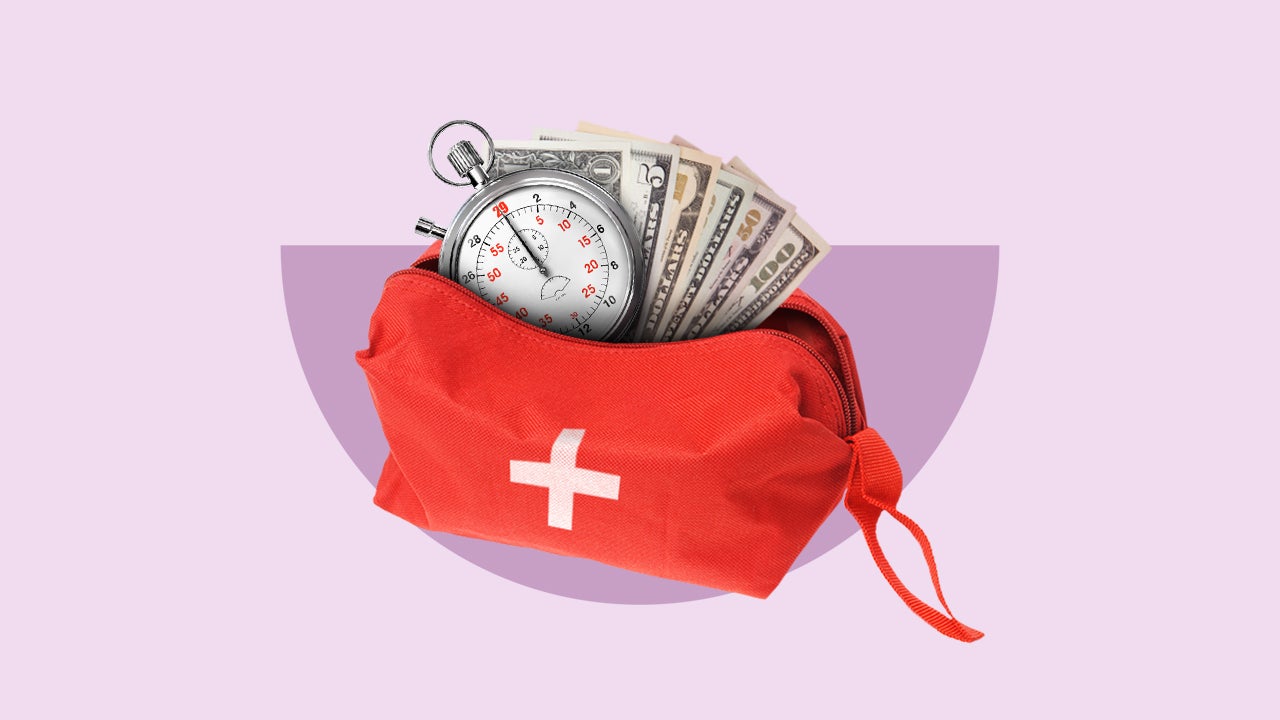Payday loans vs. installment loans: One is a much better option




Key takeaways
- Payday loans provide quick cash but have high interest rates and fees, making them risky.
- Installment loans offer larger amounts with lower interest rates and fixed monthly payments, making them more manageable.
- Installment loans are a much safer option, assuming you can afford repayment. Payday loans should be avoided.
Only about two in five Americans (41 percent) say they could pay for a major unexpected expense out of their savings, a recent Bankrate survey found. If you’re among the millions of Americans who would need to borrow money for an emergency, you could find yourself weighing payday vs. installment loans.
Payday loans may be easy to get, but they’re notorious for their high fees and can wreak havoc on your finances. Installment loans are likely a much better option, but there are other payday loan alternatives to consider as well.
Payday vs. installment loans at a glance
Payday and installment loans are borrowing options you may consider when you need cash right away. The main differences are the ease of being approved, the amount you can borrow and how long you’re given to repay the loan (plus fees and interest).
Check the chart below for a quick look at the differences:
| Payday loans | Installment loans | |
|
Collateral requirement |
Unsecured (no collateral required) |
Typically unsecured, though some lenders offer loans secured by collateral |
|
Loan amount |
Typically $500 or less |
Up to $100,000 |
|
Funding timeline |
Same day to one business day |
Same day to five business days |
|
Repayment terms |
One lump sum on your next payday (or within 14 days) |
Repaid over several months or years |
|
Interest and fees |
– Flat fee of $10 to $30 per $100 borrowed; varies by state regulations |
7%-36% |
|
Application process |
Quick, minimal requirements |
Credit check required |
|
Impact on credit |
No credit impact if repaid on time, but defaults can harm credit score |
Can improve credit if repaid on time, defaults can harm credit score |
|
Offered by |
Payday lenders (in-store and online) |
Banks, credit unions and online lenders |
How do payday loans work?
Payday loans are short-term, high-interest loans designed to help people borrow money from their next paycheck. They’re available online and from payday lending stores. While payday loans may seem like a financial lifeline in an emergency, they can worsen your financial situation due to their high rates and tendency to trap people in debt cycles.
If you’re considering getting a payday loan, it’s crucial to understand how the process works, from application to repayment:
- Applying: Most payday loans have a simple application process with few requirements. Borrowers generally need to provide proof of identity, show they have a stable income and provide their checking account information.
- Approval: Loan approvals often occur in minutes. Funds are usually delivered on the same day or within 24 hours.
- Amounts: The most you can borrow is typically $500, depending on state regulations.
- Repayment: Borrowers must repay the loan amount plus fees by their next payday, which is typically within 10 to 14 days. This is often done through a postdated check or authorization for an automatic withdrawal from the borrower’s checking account.
Pros of payday loans
Despite their many downsides, some advantages attract people to payday loans:
- Funded quickly: Payday loans offer quick access to cash. Unlike other types of loans, the funds are often available within the same day. That makes them helpful in emergencies, like if your car needs urgent repairs and you can’t wait until payday to get it fixed.
- No credit check: It’s easy to get approved for a payday loan. Unlike more reputable forms of financing, payday lenders typically don’t check your credit history or credit score to determine whether you qualify for a loan. Minimal credit requirements make payday loans accessible for borrowers with bad credit scores or no credit history.
- Limited paperwork: Compared to other types of loans, the application process is quick and simple, with limited paperwork. Payday lenders typically require only basic information, such as a government-issued ID and your most recent pay stub.
Cons of payday loans
Before taking out a quick cash advance, consider the drawbacks of payday loans:
- High fees: Payday loans often have steep fees, making them an extremely expensive borrowing option. Their flat fees may translate to an annual percentage rate (APR) of 400 percent or more. To put that into perspective, the average APR for a credit card is about 20 percent.
- Short repayment term: Payday loans are typically required to be paid in full with your next paycheck, which often means repayment within two weeks. If you can’t repay the loan, the lender may suggest that you “roll it over,” which involves borrowing a second payday loan to repay the first. This can trap you in a never ending cycle of debt.
- No credit building: A payday loan won’t help establish or repair your credit, even if you repay the loan in full and on time. Payday lenders typically don’t report any information about your payment history to the credit bureaus — unless you fail to repay the debt. So a payday loan can’t help your credit, but it may harm it.
How do installment loans work?
Installment loans provide a lump sum of money that is repaid in equal monthly installments over a set term. They’re offered by banks, credit unions and online lenders, and provide a more structured and often more affordable borrowing option than payday loans.
If you’re considering getting an installment loan, it’s crucial to understand how the process works:
- Applying: The application process for an installment loan is more thorough than that of a payday loan. You must provide more information, including proof of identity and stable income, and undergo a credit check. This information lets lenders assess your ability to repay the loan.
- Approval: If you apply online, approval typically takes only a few minutes or hours. Funding typically happens within one to four business days, though some lenders offer same-day funding.
- Amounts: Loan amounts for installment loans can range from a few hundred dollars to $100,000, depending on the lender’s policies and your creditworthiness.
- Repayment: Terms for installment loans are more borrower-friendly than payday loans. You’ll repay the loan in fixed monthly payments over several months or years, depending on the loan agreement.

The best installment loans of 2025
If you need quick access to cash, consider Bankrate's picks for the best installment lenders as a safer option to payday lending.
Learn morePros of installment loans
Compared to payday loans, there are many potential advantages of installment loans:
- Lower interest: Generally, installment loans have significantly lower APRs compared to payday loans. Rates vary depending on the lender and the loan, but typically range from 7 to 36 percent.
- Helps build credit: Most installment loan payments are reported to the major credit bureaus, so on-time payments can positively impact your credit score. However, missing payments or defaulting on the loan can negatively impact your credit score and lead to collection actions.
- More manageable payments: The extended repayment period allows for smaller, more manageable payments spread over several months or years. Fixed monthly payments also make it easier to budget.
Cons of installment loans
Like any financial product, installment loans have some potential drawbacks:
- Credit check required: A hard credit check is part of the application process for an installment loan. Borrowers with bad credit scores or no credit history may not qualify. Some lenders offer bad credit loans, but you can expect rates to be close to 36 percent.
- Long-term commitment: Monthly payments can stretch out over several years, requiring long-term financial planning and discipline. This can put your finances at risk if your circumstances change and you can’t make the payments.
- Potential for high fees: Installment loans often come with fees, including origination fees, late fees and insufficient funds fees. These fees can add to the overall cost of the loan. It’s important to compare lenders to find the lowest-cost option.
Other alternatives to payday loans
If you don’t qualify for a traditional installment loan due to bad credit, consider working with a reputable credit repair company to raise your score, rather than taking a payday loan.
When you need emergency cash and can’t wait, it may make sense to explore some other alternatives to payday loans:
- Ask family or friends: Borrowing money from a family member or friend can help you avoid high interest rates and fees. Be sure to create a contract before accepting the money to outline your repayment obligations and avoid damaging the relationship.
- Look into local resources: If you need emergency cash for basic needs like rent, food or utilities, call 211 for help finding resources and services in your area.
- Negotiate a payment plan with creditors: Contact your creditors to explain your financial situation. They might have hardship programs or payment plans that would help.
- Payday alternative loans (PALs): Credit unions sometimes offer payday alternative loans. These loans are for small amounts, usually below $2,000, are repaid over a few months and have an interest rate cap of 28 percent.
- Use a cosigner: Applying with a creditworthy friend or family member can help you qualify for a traditional personal loan. A cosigner takes on responsibility for paying the loan if you can’t, so recruiting a loved one to serve as cosigner is no small ask — if you fail to repay the debt, your cosigner’s credit will be damaged and they’ll be on the hook for repayment.
- Paycheck advance apps: Cash advance apps help you access part or all of your paycheck early. They may have lower fees than payday loans. However, they still tend to come with membership and transfer fees, so use them sparingly.
Bottom line
There’s a clear winner when it comes to comparing payday vs. installment loans. If you find yourself in a difficult financial situation, a payday loan is unlikely to be the lifeline it appears. With their high fees and short repayment terms, these short-term loans often trap borrowers in a cycle of debt.
Before borrowing a payday loan, take a serious look at installment loans and consider other payday loan alternatives.
Frequently asked questions
Why we ask for feedback Your feedback helps us improve our content and services. It takes less than a minute to complete.
Your responses are anonymous and will only be used for improving our website.
You may also like

How fast can you get a loan in an emergency?

How to spot personal loan scams and protect your finances

Should you get a personal loan? Here are the pros and cons

Payday loan alternatives that could save you money
